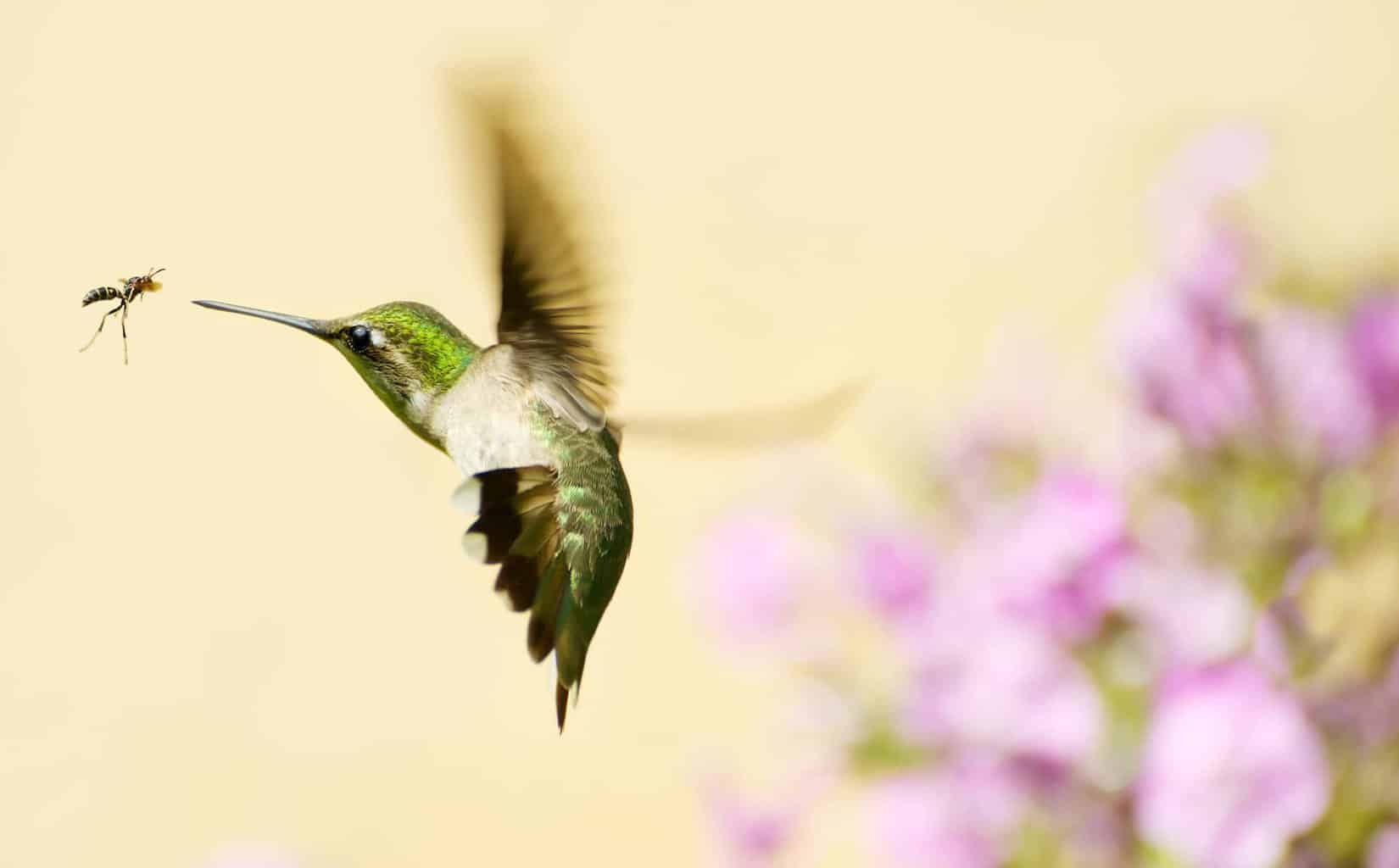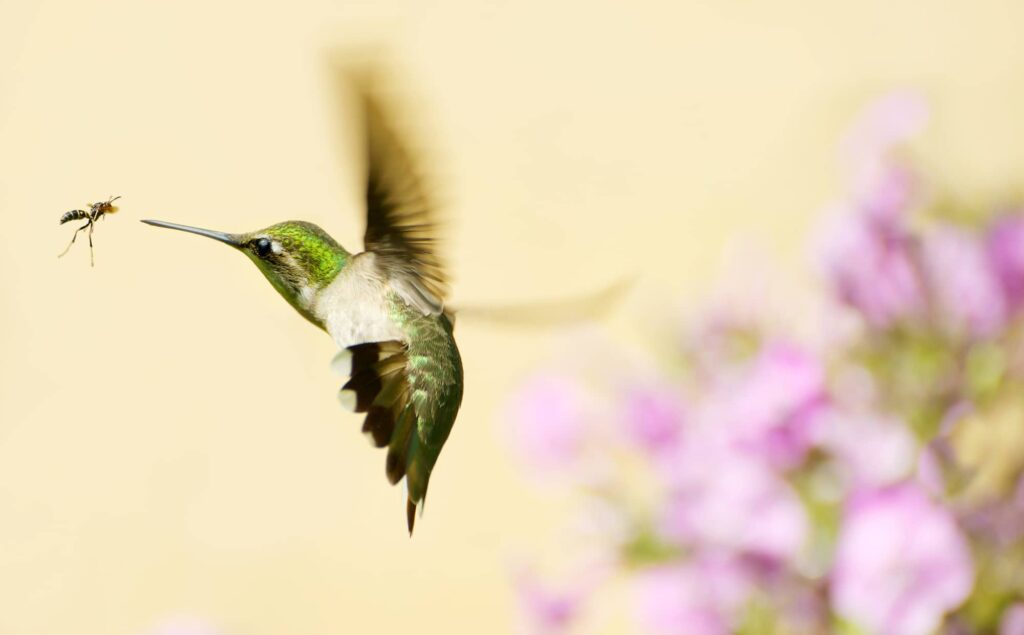Most people know that a hummingbird’s diet consists primarily of nectar from flowers. But watch hummingbirds at any time, and you will soon realize that this is not all they consume. Hummingbirds also eat bugs.
Do Hummingbirds Eat Bugs?
As well as using nectar as an energy source, hummingbirds also eat a range of bugs – insects and arachnids – as part of their diet. A hummingbird’s insect prey is surprisingly varied and makes up a much higher proportion of their diet than ecologists previously thought.
Most people think that since hummingbirds are such small birds, they have a dainty appetite. But though small, these birds can be voracious. You might be astonished to hear that these birds can eat half their body weight every day!
These are insect-eating birds – or insectivorous birds as they are also known. As expert bird watchers will attest, they consume a wide variety of insects and arachnids.
What Proportion of Insects Are There in a Hummingbird’s Diet?
Insects are a crucial food source for hummingbirds and constitute a large part of their diet. They can consume from dozens to thousands of bugs in just one day.
A hummingbird may obtain half or even up to 80% of the energy it requires by eating insects. The insects they eat, along with the nectar and other foods they consume, help them pack on the weight they need to migrate or make it through the winter months successfully.
What Else Do Hummingbirds Eat?
Of course, hummingbirds consume a lot of nectar from various flowers and hummingbird feeders. Nectar is an important part of the hummingbird diet and is a quick, sweet energy source. During the day, they may need to eat every 10 minutes or so and excrete waste every 20 minutes or so. So finding food is a constant preoccupation during the daylight hours.
They have an amazing forked tongue that can extend into tubular flowers to get to the sweet liquid within. This tongue moves very quickly, allowing them to lick up to 13 times in just one second.
Hummingbirds are also opportunistic feeders. They will gorge on the juice of ripe fruits that fall from a tree or fruit pieces left out on a fruit plate. They may also drink sap from a pole in a tree made by a woodpecker or another species.
But while nectar, juice from sweet fruits and berries, and sap are all important, hummingbirds also need to eat insects, too.
Why Do Hummingbirds Eat Insects?
Hummingbirds need to eat a variety of insects since only with a varied diet can they obtain all the nutrients they need. Insects contain the minerals, vitamins, proteins and amino acids, oils, fats, and fiber these hard-working birds need to survive.
Where there is a deficiency of insect species, hummingbirds’ nutrition will suffer, and their life expectancy will be reduced.
What Kind of Insects Do Hummingbirds Eat?
Hummingbirds eat a vast range of minute insects and arachnids, including:
- Species of Ants (Including leaf-cutter ants, guest ants, army ants, etc.)
- Common Aphid species (Several genera and species of sap-sucking insect.)
- Common Beetles (Ground beetles, stag beetles, carrion beetles, etc.)
- Flies (Including crane flies, humble flies, snipe flies, minute black scavenger flies, etc.)
- Many common Gnat species (buffalo gnats, fungus gnats, etc.)
- Harvestmen (AKA daddy longlegs, harvesters)
- Leafhoppers (numerous common species, many agricultural and garden pests)
- Mites
- Mosquitoes & Midges
- Spider species (Grass spiders, ant spiders, crab spiders, black widow spiders, etc.)
- Wasps (Yellowjackets, spider wasps, paper wasps, etc.)
- Weevils
And more. Hummingbirds have also been known to consume smaller larvae, caterpillars, and insect eggs. The specific bug preference will depend on which type of hummingbird we are talking about and where precisely they live.
But whether you are talking about Ruby-throated hummingbirds, Rufous hummingbirds, or other hummingbird species commonly found across large parts of North America, you can expect a large variety of insects to be consumed if you have hummingbirds present in your area.
Do Hummingbirds Help With Mosquitoes and Other Insect Pests?

One key thing to note is that as hummingbirds eat insects and other prey, they are feeding themselves and helping keep natural ecosystems in balance – and helping gardeners in their outside spaces.
Hummingbirds can help keep down the populations of biting species like mosquitoes in your garden – meaning fewer insect bites for human inhabitants. They also help predate common food crop pests, like aphids, to keep their numbers down.
So, having hummingbirds in your garden can help you if you like to grow your own food at home and make your garden a more pleasant place to spend time. You’ll enjoy yard time a lot more if you don’t have to contend with a problematic insect population.
How and Where Hummingbirds Prey on Insects
Hummingbirds will hunt out insect feasts in a range of locations. They may, for example, hover around colonies of social insects, pluck tiny, sap-sucking insects off a range of plants, or find bugs hiding in the flowers they visit for nectar. They will also seek out spiders in webs or other bugs in holes in tree bark, branches, dark corners, or holes in walls.
However, most commonly, they will catch insects in flight. Known as hawking, this method of catching insects on the wing means that small, flying bugs are among their favorite prey.
Hummingbirds have bills that make it easy to catch insects on the wing or snap them up in passing.
How To Make Sure You Have Bugs For Hummingbirds to Eat in Your Garden
Interestingly, hummingbirds prefer to catch live prey. So placing dead bugs on bird feeders won’t be of much benefit to these birds. Instead, it is important to make sure that you have as much biodiversity in your garden as possible – so that there are plenty of live insects around for them to eat.
Always garden organically to ensure that you don’t kill off beneficial insects or reduce the species count where you live.
Create a range of bug habitats to encourage beneficial insects (and as an attractant for hummingbirds and other things that eat them) into your space.
Bodies of water, like wildlife ponds, can be beneficial because they give these beautiful birds a place to cool down and bathe, and they also encourage plenty of insects to make your garden their home.
Plant diverse and varied native plants to create functional, ecologically sound yard environments for the wildlife that shares your space. Think about creating planting schemes that bugs, as well as hummingbirds, will love.
Placing feeders can help ensure that there is never a scarcity of food. But, creating a garden with plenty of natural food sources and providing food in its natural form is the best way to help hummingbirds where you live.

